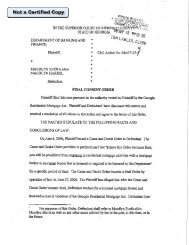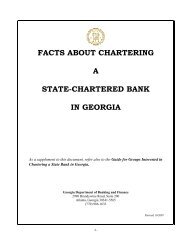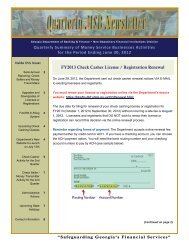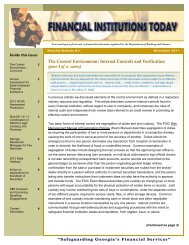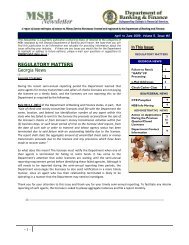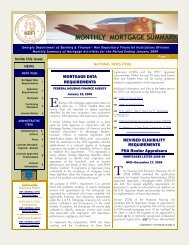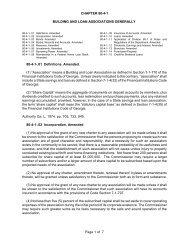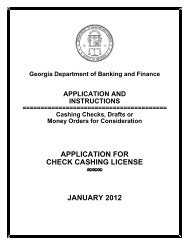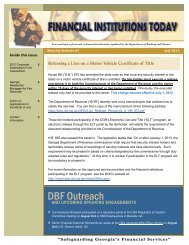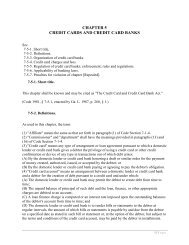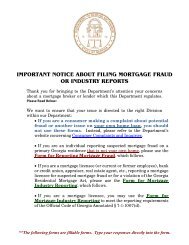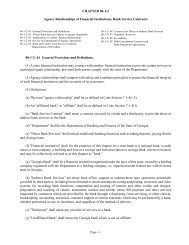OFFICIAL OPINION 2003-9 - Department of Banking and Finance
OFFICIAL OPINION 2003-9 - Department of Banking and Finance
OFFICIAL OPINION 2003-9 - Department of Banking and Finance
You also want an ePaper? Increase the reach of your titles
YUMPU automatically turns print PDFs into web optimized ePapers that Google loves.
determination would have to be made whether the bank has a factual justification for the differentiation in the fee<br />
amounts (e.g., higher costs to the bank in processing an overdraft than in returning the check for insufficient funds).<br />
So long as the overdraft threshold is not determined based on the amount <strong>and</strong> time value <strong>of</strong> overdraft amounts, the<br />
overdraft threshold is irrelevant to the determination <strong>of</strong> whether an overdraft fee is “interest.”<br />
3. The facts are as set forth in item 1, except that the overdraft program also provides that the bank charges a daily<br />
fee for each day that an honored overdraft item remains unreimbursed to the bank by the consumer. (Consider this<br />
program also as modified in each <strong>of</strong> the different threshold determinations described in variants (a), (b), <strong>and</strong> (c)<br />
above.)<br />
At first consideration, the fee charged under the assumed facts <strong>of</strong> hypothetical 3 <strong>and</strong> threshold variants 3(a), 3(b),<br />
<strong>and</strong> 3(c) does appear to be a simple “time value <strong>of</strong> money” calculation. If so, the imposition <strong>of</strong> the fee would<br />
constitute the imposition <strong>of</strong> “interest” <strong>and</strong> the Georgia general usury laws would apply to transactions in which such<br />
a fee were charged. However, it may be possible for the bank to demonstrate that the daily fee is economically<br />
equivalent to the flat fee charged <strong>and</strong> actual costs covered as posited in hypothetical 1 <strong>and</strong> its corresponding<br />
response above. So long as the overdraft threshold is not determined based on the amount <strong>and</strong> time value <strong>of</strong><br />
overdraft amounts, the overdraft threshold is irrelevant to the determination <strong>of</strong> whether an overdraft fee is “interest.”<br />
4. The program is as described in any <strong>of</strong> the factual scenarios set forth above with the additional provision that the<br />
bank is obligated by written agreement to honor (pay) overdraft items on behalf <strong>of</strong> the customer up to a prescribed<br />
limit.<br />
The bank’s obligation to pay the overdraft as contemplated in hypothetical 4 is significant. In each <strong>of</strong> the preceding<br />
transactions, the assumption is that the bank may honor checks presented against an account notwithst<strong>and</strong>ing<br />
insufficient funds, that the bank is never obligated to honor the checks <strong>and</strong> could return them unpaid, <strong>and</strong> that the<br />
depositor is required by the terms <strong>of</strong> the governing deposit agreement to repay each honored overdraft <strong>and</strong> related<br />
overdraft fee immediately without dem<strong>and</strong> or notice.<br />
The additional assumption <strong>of</strong> hypothetical 4 makes it more difficult to characterize the transaction as a checking<br />
account transaction as opposed to an extension <strong>of</strong> credit or a loan. See Video Trax, Inc. v. NationsBank, 33 F.<br />
Supp.2d 1041, 1053-54 (S.D. Fla. 1998) (distinguishing the concepts). In hypothetical 4, the bank must pay the draft<br />
from its funds. However, the facts <strong>of</strong> this scenario do not include other facts that may have significance, such as<br />
whether the depositor is required by agreement to repay immediately both the overdraft <strong>and</strong> the overdraft fee or<br />
whether, in the reality <strong>of</strong> the transaction or by agreement, a certain period <strong>of</strong> grace routinely follows. It remains<br />
pertinent whether any fee is determined based on the amount <strong>and</strong> time value <strong>of</strong> overdrafted amounts.<br />
Therefore, under the general facts set forth above, it is my <strong>of</strong>ficial opinion that an overdraft fee will not be<br />
considered interest when the transaction is readily characterized as a checking account transaction, lacking the legal<br />
<strong>and</strong> economic reality <strong>of</strong> a loan or extension <strong>of</strong> credit, <strong>and</strong> when the fee is not determined based on the amount <strong>and</strong><br />
time value <strong>of</strong> overdraft amounts. 3 See generally Video Trax, Inc. v. NationsBank, 33 F. Supp. 2d 1041, 1053-54<br />
(S.D. Fla. 1998); First Bank v. Tony’s Tortilla Factory, Inc., 877 S.W.2d 285 (Tex. 1994); Bernstein v. Alpha Assoc.<br />
(In re Frigitemp Corp.), 34 B.R. 1000 (Bankr. S.D.N.Y. 1983). 4<br />
Prepared by:<br />
Shirley R. Kinsey<br />
Assistant Attorney General<br />
1 A “time value <strong>of</strong> money” formula involving simple interest for a loan <strong>of</strong> one year or more can be stated as:<br />
Effective ratesimple = Stated (or nominal) rate ÷ Principal Amount <strong>of</strong> Loan. A “time value <strong>of</strong> money” formula for a<br />
loan involving compound interest can be stated as: FVn = PV(1+(knom ÷ m)) mn , where FV = future value, n =<br />
number <strong>of</strong> years, m = number <strong>of</strong> times per year compounding occurs, PV = present value, <strong>and</strong> knom = stated (or<br />
http://www.state.ga.us/ag/read.cgi?searchval=overdraft%20plans&openval=03-9



